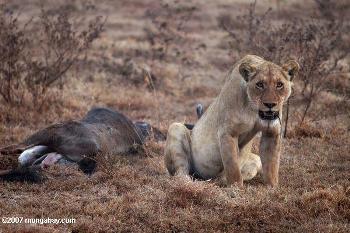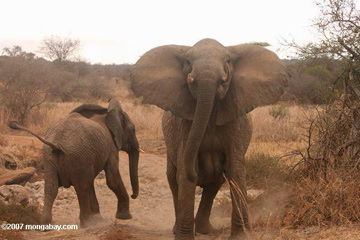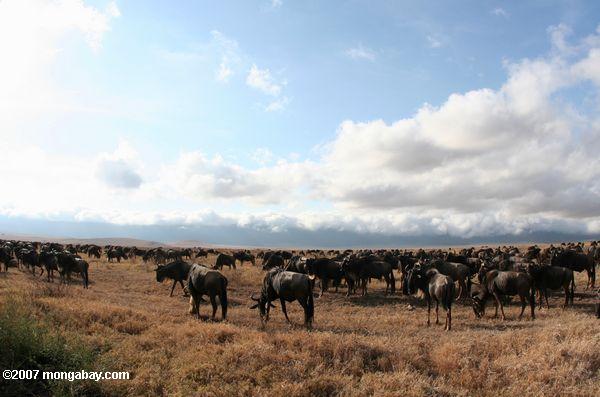Tanzania’s President, Jakaya Kikwete, today gave promises that his proposed road project, which will bisect the Serengeti plains, would not hurt one of the world’s most famed parks and one of its last great land migrations.
“The Serengeti is a jewel of our nation as well as for the international community. […] We will do nothing to hurt the Serengeti and we would like the international community to know this,” Kikwete said in a statement reported by the AFP.
However, a government environment impact study, leaked to the conservation organization Serengeti Watch, paints a very different picture of how the road will damage the Serengeti. The report includes warnings that the road will ‘limit’ the migration of the plains’ 1.5 million wildebeest and 500,000 other herbivores including zebra.
 Female lion guards a wildebeest kill in Tanzania. A leaked government study warns that a proposed road project would hurt the Serengeti’s big predator species. Photo by: Rhett A. Butler. |
Under the heading: “Loss of unique value of the Serengeti” the report reads “the migration may be limited by the high level of traffic that will disrupt [it]. […] This is a major concern that has caused a lot of publicity for the NMKTL road project. It is argued that only will the wildebeest be affected but the animals that prey on them will also be impacted if the migration is disrupted”.
In other words, not only will wildebeest suffer from the road project—a recent scientific study found that the herd will likely drop by at least 35%—but the predators that depend on them: lions, leopard, hyenas, cheetahs, and Nile crocodiles will also face significant declines.
By 2015, the report predicts, 800 vehicles per day will cross the proposed 30 mile (50 kilometer) stretch of the park. By 2035, the number of vehicles per day is expected to rise to 3,000, or well over a million a year.
In an attempt to diffuse the criticism Kikwete has pointed out that the road will not be paved.
“No tarmac road will be built through the Serengeti. We will only build a road around the park to ease very serious transport challenges facing the poorer communities around the park,” Kikwete said in a statement.
However, co-founder of the group Serengeti Watch, Dave Blanton told the Canadian Press that given the amount of traffic expected the road could not stay unpaved for long.
“They have clear plans for a major commercial route between Lake Victoria and the Indian Ocean. I think common sense would say with that volume of traffic there is no way you could have a dirt road on top of that soil. Paving and fencing is the future. No one doubts that.”
Renowned conservationist Richard Leakey agrees. Last year he stated that while the road may not initially stop wildebeest, zebra, and antelope from making their annual journal, eventually—when traffic rises and demand leads to paving and more development—the road will “kill the migration”.
The leaked report appears to bear this out, portending that “envisioned development in the future will have a significant impact on all of the conservation areas along the NMKTL road.”
 African savanna elephants in the Serengeti. Photo by: Rhett A. Butler. |
The leaked government report also warns that the road will hurt endangered species, including rhinos and the oribi antelope.
“There has been a re-introduction of rhinos in the project area and these sensitive animals will be subject to traffic and poaching,” the report reads, adding, “the shy oribi is also found in the eastern corridor and this antelope would be disturbed with the increased traffic.”
According to the report the road may have a negative impact on Tanzania’s neighbor to the north, Kenya, which is home to the northern part of the Serengeti’s plans the Masaai Mara.
“A reduction in the migration of the Serengeti would lead to impacts on the Masaai Mara and bordering wildlife areas,” reads the report, adding that Tanzania’s road would have “consequent impacts” on Kenya’s tourism industry.
A southern route for the road has been proposed that would link the same cities. In an effort to save the Serengeti from development, the World Bank offered to provide funding for this alternative route. However, Kikwete stated that he has turned down their offer, because the southern route would not reach poor communities living on the northern edge of Serengeti National Park.
“We will continue with our serious efforts of conservation, but we cannot deny these people living on the northern side of the Serengeti border a road. There is neither justification nor explanation for not building this important road,” Kikwete said, pointing out that some northern communities must travel for hours daily to reach water and electricity.
However, conservationists contend that the southern route would connect more people and keep Serengeti wildlife safe from becoming road kill.
Given the international and scientific outcry, Blanton says that the whole proposal has left critics baffled.
“Why is this so important to them? Nobody seems to understand because it doesn’t add up. They could do the southern road and accomplish basically the same thing. It really depends on that hidden motive, that huge unknown factor leading them on. Whether there’s some big economic incentive or geopolitical scheme involved we just don’t know.”

Wildebeest herd in Tanzania. Photo by: Rhett A. Butler.
Related articles
Scientists: road through Serengeti would likely end wildebeest migration
(02/02/2011) A new study finds that a proposed road cutting through Serengeti National Park would likely have devastating consequences for one of the world’s last great migrations. According to the study the road itself could lead to a 35% loss in the famed park’s migrating wildebeest herd, essentially cutting the herd down by over half a million animals. Despite such concerns, and the availability of an alternative route that would bypass the Serengeti plains altogether, the Tanzanian government has stated it is going ahead with the controversial road.
World Bank offers to save Serengeti from bisecting road
(01/31/2011) The World Bank has offered to help fund an alternative route for a planned road project that would otherwise cut through Tanzania’s world famous Serengeti National Park, according to the German-based NGO Nature and Biodiversity Conservation Union (NABU). When announced last year, the road project raised protests from environmentalists, scientists, and Tanzanian tour companies, but the Tanzanian government refused to shift plans to an alternative southern route for the road, thereby bypassing the park.
Road through the Serengeti will eventually ‘kill the migration’

(07/08/2010) Tourists, conservationists, individuals, and tour companies have launched an international outcry against the Tanzanian authorities in response to the announcement of the planned construction of the trans-Serengeti Highway highway. There is even a Facebook group and an online petition with 5,038 signatures. But the government has responded by saying that the plans are still on course.














